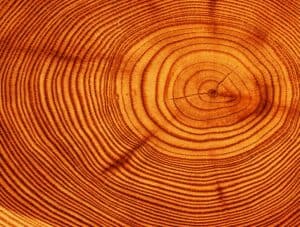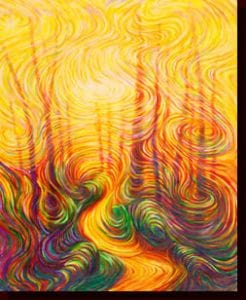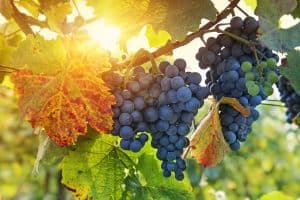God with us
I am a voice crying out in the wilderness, prepare the way of the Lord.
We stand always in the shoes of John the Baptist: we prepare a way for the Lord: always we are clearing a place within ourselves for God’s appearing of God. Perhaps like John we will even go outside the walls, outside the city, into desert places.
This week I have been thinking about Church growth; it appears there is a cottage industry of statisticians, who can demonstrate that growing churches cultivate families and their children, are welcoming and invitational, and have activities mid-week. Well, it seemed to me that much of this is small chop, really. I often felt the sheer philosophical poverty of these discussions.
Our immediate task is not, I think, to become better at doing it better. No, we need first to ask a spiritual question—the God question. So many of us no longer feel the presence of the One who is among us as our bond of peace; we do not live in an enchanted world of participation in God; we no longer know the God of Sabbath rest, who restores us to life and health. So many of us do not feel that we ourselves are the place where God appears—that we ourselves are God’s holy Temple, the bearers of God’s image.
Maybe our starting point should be to consider our estrangement from God. We are cast apart from one another and from the natural world: we live in such a constructed world, a technologised world of profit and production. Voices from on high speak of a post-human future of artificial intelligence—a frightening dictat. Is this not increasingly a Hobbesian world of war of all against all, a world of merely contracted peace and strong government. What, then is our estrangement from God but our estrangement from our own humanity? These are mutually implicated.
All the people came out from Jerusalem and all the Judean countryside, to be washed in the birth-waters of the land: so they cleared a place within themselves for the appearing of God.
Perhaps we too are called to return to the wilderness, where the birds sing and the stars shine, in order to remember who we are and were. Perhaps we should, first and foremost, not worry ourselves about growing the Church, but about being the Church—the Church that cries out from the wilderness, lamenting the loss of our humanity, singing of another future. If there is to be growth, in God’s time, surely we must offer people a way to reconnect with warmth and home in a world grown cold. We must proclaim that God is, actually, with us and within us—and that we ourselves are God’s Holy Temple.
 Many people are speaking like this. Dianna Butler Bass, the contemporary writer on religion, talks of the spiritual revolution happening right now—a loss of confidence in the distant God, enthroned in divine majesty, but not, by and large, a loss of faith and hope in the sacred or, for that matter in humanity. We seek the God who is with us, the Ground of Being (Tillich) through and in all things.
Many people are speaking like this. Dianna Butler Bass, the contemporary writer on religion, talks of the spiritual revolution happening right now—a loss of confidence in the distant God, enthroned in divine majesty, but not, by and large, a loss of faith and hope in the sacred or, for that matter in humanity. We seek the God who is with us, the Ground of Being (Tillich) through and in all things.
In her book, entitled Grounded, she talks of a Celtic service she attended at St Stephen’s Episcopal Church, Virginia late one afternoon. The nave was lit only by hundreds of burning candles and the natural light streaming through the windows. The place was full of people. The sound of traditional celtic instruments was in the air. The service began, she said, with a poem by Mary Oliver called “When I am among the trees”:
When I am among the trees
especially the willows and the honey locust,
equally the beech, the oaks, and the pines,
they give off such hints of gladness.
I would almost say that they save me, and daily.
I am so distant from the hope of myself,
in which I have goodness, and discernment,
and never hurry through the world
but walk slowly, and bow often.
Around me the trees stir in their leaves
and call out, “stay awhile.”
The light flows from their branches,
And they call again, “It’s simple,” they say,
“and you, too, have come
into the world to do this, to go easy,
to be filled with light, and to shine.”

After the service everyone shared a meal, a picnic on the lawn. Bass says “people practised hospitality as if they were welcoming you into their own home. Everyone was talking to everyone else, greeting friends and strangers alike.” Here, she says, was church growth, not growth based on programmes, but on getting in touch with the yearning of our time. Yes, we are looking for a church outside the walls, the church of humanity, the church of nature, the church of Immanuel, God with us. We are yearning to remember we are the Temple of the living God: we ourselves, with all the natural world, are the place of God’s appearing.
She says: “It is surprisingly easy to join in [the spiritual revolution]: get off the elevator, feel your feet on the ground, take a walk or hike, plant a garden, clean up a watershed, act on behalf of the earth, find your roots, honour your family and home, love your neighbour as yourself… Pay attention. Play. Sing new songs, recite poetry, write new prayers and liturgies, learn sacred texts, make friends with those of other faiths, celebrate the cycles of the seasons, and embrace ancient wisdom. Weep with those who mourn. Listen for the whisper of God everywhere. Work for justice. Know that your life is in communion with all life.”
Advent is a time of preparation: so let us like all the people of Judea, go out into the desert, outside the walls. We go to find the Church of humanity, the Church of the God—the God who is with us, whose image we bear.
Amen.


